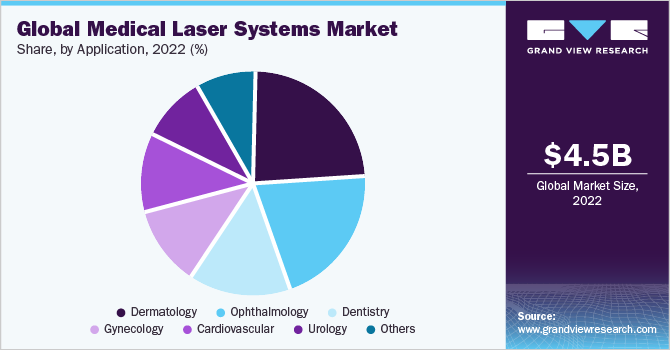Medical Laser Systems Market Analysis by Product, Application, and Region
The global medical laser systems market is on a strong growth trajectory, driven by the rising demand for minimally invasive procedures, cosmetic enhancements, and chronic disease management.
The global medical laser systems market size was valued at USD 4.52 billion in 2022 and is expected to reach USD 14.0 billion by 2030, growing at a compound annual growth rate (CAGR) of 15.2% from 2023 to 2030. Market growth is driven by several key factors, including the increasing demand for advanced and minimally invasive treatment alternatives, significant technological advancements, rising patient awareness, and favorable reimbursement policies.
The expanding range of applications for medical lasers further amplifies their market potential. A medical laser is a precision device that uses focused light to diagnose and treat biological conditions while minimizing damage to surrounding tissues. Rising demand for cosmetic procedures and the growing prevalence of chronic diseases are expected to accelerate adoption over the forecast period.

The increasing incidence of chronic conditions such as cancer, cardiovascular disorders, and ophthalmic diseases is fueling the need for advanced therapeutic alternatives. Medical lasers have become essential tools in modern healthcare due to their ability to enable minimally invasive, accurate, and efficient treatments. Continuous advancements in laser technology have led to the development of more specialized and high-performance systems, improving treatment outcomes, reducing recovery times, and broadening the scope of procedures achievable through laser-based interventions.
A clear trend is emerging among patients who prefer less invasive treatment options to minimize scarring, reduce pain, and ensure faster recovery. Medical lasers effectively address these preferences by delivering precise, targeted interventions with minimal tissue damage. Furthermore, the aging global population is driving higher demand for treatments addressing age-related conditions, including cataracts, macular degeneration, and skin disorders. Consequently, the adoption of medical laser systems for these indications has increased significantly, propelling overall market growth.
Key Market Trends & Insights
- North America dominated the market, accounting for the largest revenue share of 45.9% in 2022.
- Based on product, the diode lasers segment held the largest revenue share of 43.8% in 2022.
- Based on application, the dermatology segment led the market with a 24.2% revenue share in 2022.
Download a free sample PDF of the Medical Laser Systems Market Intelligence Study, published by Grand View Research.
Market Performance
- 2022 Market Size: USD 4.52 Billion
- 2030 Projected Market Size: USD 14.0 Billion
- CAGR (2023–2030): 15.2%
- North America: Largest market in 2022
- Asia Pacific: Fastest growing market
Competitive Landscape
The global medical laser systems market is highly competitive, characterized by continuous technological innovation and research-driven advancements. Leading companies are focusing on product development, strategic collaborations, and R&D investments to enhance product efficiency, safety, and clinical outcomes.
Lumenis Be Ltd. is among the prominent players, offering a wide range of light radiation and energy-based technologies for various specialties, including dermatology, aesthetics, urology, and ophthalmology.
For instance, in January 2020, Lumenis Be Ltd. launched the LightSheer Quattro platform, an advanced addition to its LightSheer portfolio. This system provides clinically validated laser hair removal treatments for all skin types and features dual wavelength options (805 nm and 1060 nm) for versatility. Beyond hair removal, it also addresses pigmented and vascular lesions, broadening its clinical applications. Key technologies such as high-speed vacuum-assisted technology and ChillTip-integrated contact cooling ensure comfort, safety, and efficiency, resulting in superior clinical outcomes and minimal downtime for patients.
Key Companies
- Lumenix
- Photomedex
- Philips Healthcare
- BIOLASE, Inc.
- IRIDEX Corporation
- BioForm Medical, Inc.
- biolitec AG
- Cutera
- Candela Corporation
- Cynosure
Explore Horizon Databook – the world’s most comprehensive market intelligence platform by Grand View Research.
Conclusion
The global medical laser systems market is on a strong growth trajectory, driven by the rising demand for minimally invasive procedures, cosmetic enhancements, and chronic disease management. Technological advancements and innovation in laser precision, energy efficiency, and multi-functional applications are significantly improving treatment quality and patient outcomes. With increasing adoption in dermatology, ophthalmology, and aesthetic medicine, coupled with the expanding geriatric population, the market is expected to witness sustained momentum. As companies focus on research, product innovation, and strategic collaborations, medical laser systems will continue to play a vital role in shaping the future of modern healthcare.